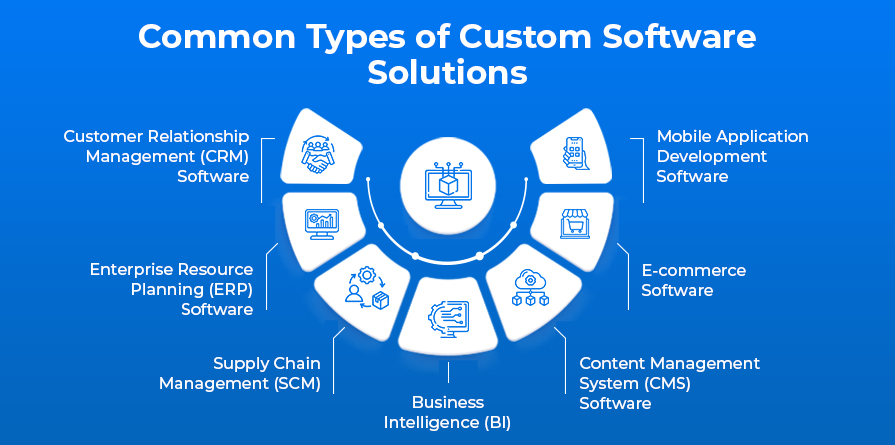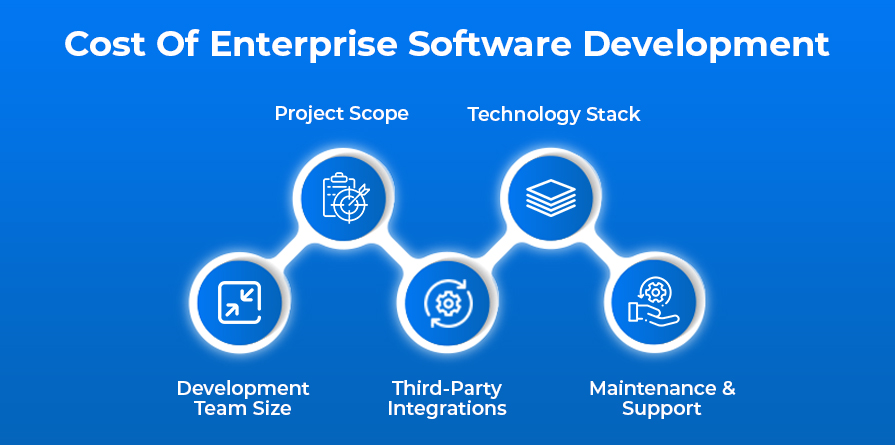Things to Consider Before Developing Custom Enterprise Software
Custom enterprise software development is growing more and more popular among companies seeking to differentiate themselves from the competition and enhance operational effectiveness.
Custom enterprise software solutions are created to satisfy the unique requirements of a company or organization, and they offer a number of advantages like increased customer service, better data management, and streamlined business procedures.
It’s crucial to carefully assess a number of key elements before starting a custom corporate software development project, such as project scope, development team size, technology stack, third-party integrations, and ongoing maintenance and support costs.
Table of Contents
- What is custom enterprise software development?
- Common types of custom software solutions
- The benefits of custom enterprise software
- Before developing custom enterprise software, things you need to know
- How to Create Enterprise Software for Your Business?
- Cost of enterprise software development
- Conclusion
What is custom enterprise software development?
The process of developing enterprise software that is specially tailored to an organization’s particular goals and specifications is known as
custom software development.
This kind of software is frequently created for a particular firm or industry with the goals of enhancing efficiency, gaining a competitive edge, and improving business processes. Custom enterprise software is crafted to the precise demands of the organization, offering a highly personalized and effective solution, in contrast to off-the-shelf software solutions that are intended to fit the needs of a broad audience.
Understanding the organization’s business procedures, objectives, and existing technological infrastructure is essential for creating custom enterprise software. The IT department of a company may design this kind of software internally, or the project may be outsourced to a custom software development company.
- A survey conducted by the McKinsey Global Institute found that the implementation of digital transformation technologies, including custom enterprise software, can lead to productivity gains of up to 20%.
- The global market size for custom software development was valued at $148.5 billion in 2019, and is projected to reach $212.2 billion by 2025, growing at a CAGR of 6.4%.
Common Types Of Custom Software Solutions

Custom software solutions come in a wide variety and are each made to match certain demands and specifications. Here are some of the most typical uses for various kinds of bespoke software solutions:
1) Customer Relationship Management (CRM) Software
CRM software is made to assist companies in managing and analyzing customer interactions and data across the course of a customer’s lifecycle. Businesses may enhance client interactions and maximize sales and marketing efforts with the use of this kind of software.
2) Enterprise Resource Planning (ERP) Software
ERP software is a category of software that aids companies in managing and automating their essential business operations, including finance, human resources, and inventory control. Businesses may boost productivity and simplify operations with the use of this kind of software.
3) Supply Chain Management (SCM) Software
SCM software is made to assist firms in managing all aspects of their supply chains, such as procurement, inventory control, and transportation. Businesses may increase productivity and optimize their supply chains with the use of this kind of software.
4) Business Intelligence (BI) Software
Businesses may use BI software to gather, analyze, and display data to support decision-making. Businesses may use this kind of software to obtain insights into their processes and make data-driven choices.
5) Content Management System (CMS) Software
Web pages, documents, and media assets may all be managed and published by organizations with the use of CMS software. Businesses can enhance content development and dissemination procedures with the aid of this kind of software.
6) E-commerce Software
Software for online sales of goods and services is known as e-commerce software. Features like product catalogs, shopping carts, and payment processing are all possible with this kind of software.
7) Mobile Application Development Software
Businesses may create mobile applications for iOS and Android devices with the use of tools for mobile application development. By extending their reach and increasing client interaction, organizations may benefit from this kind of software.
With customized solutions that may help organizations fulfill their unique goals and requirements and increase efficiency, productivity, and customer experience, bespoke software solutions can be quite successful.
The Benefits Of Custom Enterprise Software
There are many benefits of custom enterprise software, including:
- Tailored to Specific Business Needs: Custom enterprise software is created to match the particular demands and needs of a company, offering a highly tailored solution that takes on certain problems and pain areas.
- Improved Efficiency and Productivity: Custom enterprise software may boost productivity and efficiency by streamlining corporate procedures, automating tedious jobs, and providing real-time data and analytics.
- Enhanced Customer Experience: One of the main advantages of developing bespoke company software is improved client experience. Businesses may offer a smooth and customized experience that differentiates them from their rivals by creating software that is especially tuned to the demands of their consumers.
- Competitive Advantage: Development of unique enterprise software may provide companies a competitive edge over rivals. Businesses may simplify processes, improve productivity, and deliver a better customer experience by building software that is uniquely adapted to their particular needs and requirements. This can help them stand out in a crowded market.
- Scalability and Flexibility: Two important advantages of developing bespoke corporate software are scalability and flexibility. Custom software may be created and scaled to meet a company’s expanding demands and shifting priorities, offering a flexible answer that can meet changing business goals.
- Increased Data Security: One of the main advantages of developing bespoke company software is increased data security. Businesses may use bespoke software to create security measures that are suited to their requirements, ensuring that their critical data is safeguarded from unauthorized access and online dangers.
- Cost-Effective: While the initial cost of bespoke enterprise software may be greater than that of off-the-shelf solutions, organizations may avoid the recurring expenditures related to licensing, maintenance, and updates of off-the-shelf solutions, which can result in considerable long-term cost savings.
Businesses of all sizes and sectors may benefit greatly from using bespoke enterprise software, which helps them run more effectively, offer better customer experiences, and maintain their competitiveness in a fast changing digital environment.
Before Developing Custom Enterprise Software, Things You Need To Know
Before developing custom enterprise software, it is important to understand the following things:
- Business Goals and Objectives: The corporate goals and objectives that the bespoke software will assist achieve must be spelled out in detail. This will guarantee that the software is created to fulfill specific business demands and is in line with the broader business plan.
- Current Infrastructure: It is crucial to comprehend the hardware, software, and networking components of the existing technological infrastructure. This will make it easier to verify that the unique software can easily interact with current systems and technology.
- User Needs: Understanding the wants and demands of end users, such as staff members, clients, and other stakeholders, is crucial. This will make it more likely that the bespoke software will be simple to use, intuitive, and created with the user experience in mind.
- Budget and Resources: Custom corporate software development might require a sizable time and resource commitment. The budget and resources allocated for the project, as well as the expenses related to creation, testing, implementation, and continuing maintenance, must be understood well.
- Project Timeline: The project schedule, including significant checkpoints and deliverables, must be understood well. This will make it more likely that the project will stay on course and be finished on schedule and under budget.
- Security and Compliance: The bespoke software must be made with security and compliance in mind, including data privacy and legal constraints.
- Development Methodology: It is crucial to choose a suitable development technique for the project, such as Waterfall or Agile. By doing this, you can make sure that the project is handled well and that all parties involved are communicating and working together as efficiently as possible.
- Vendor Selection: If you intend to collaborate with a third party vendor or software development company to create the custom software, it’s crucial to thoroughly assess possible suppliers and choose one with the knowledge, skills, and track record necessary to complete the project effectively. Think on things like the vendor’s track record, customer references, communication abilities, and capacity to fulfill deadlines.
- Maintenance and Support: To keep it working and up to date, custom business software needs constant upkeep and support. Prior to creating the program, it’s crucial to think about the requirements for continuous upkeep and support, such as bug repairs, user training, and software upgrades.
- Integration with Third-Party Software: Custom business software frequently has to be integrated with other software programs, such as CRM, ERP, or accounting programs. It is crucial to take the integration needs into account when building the software and to make sure that it is built to integrate easily with other technologies and systems. This can necessitate more development effort or teaming up with outside software suppliers.
Businesses may guarantee that the project is created to suit unique needs and specifications, is aligned with corporate goals and objectives, and is finished on time and under budget by knowing these crucial elements before starting to develop bespoke enterprise software.
How to Create Enterprise Software for Your Business?
Creating enterprise software for your business involves several key steps:
- Define Business Requirements: Identifying your company requirements is the first stage in developing enterprise software. This entails identifying problems and places where software might enhance corporate processes, boost productivity, and cut costs. To make sure that the software is created to fulfill the demands of all parties, collect feedback from important stakeholders such as staff, clients, and partners.
- Choose the Right Development Methodology: Once your business needs have been established, you must select the best development technique for your project. Agile, Waterfall, and DevOps are common development approaches. It’s critical to select the methodology that best meets the demands of your project because each methodology has advantages and disadvantages.
- Hire an Experienced Development Team: For your corporate software project to be successful, you must hire a skilled development team. Look for developers that have knowledge of the programming languages and technologies necessary for your project as well as expertise in your sector.
- Develop and Test the Software: The software is developed and tested during this phase in accordance with the specified development methodology and business requirements. Before deploying the program, careful testing is essential to find any defects or problems and repair them.
- Deploy the Software: Deploying the program to your production environment after it has been created and tested. This includes installing the program on your servers, setting it up, and making sure it’s functional.
- Provide Ongoing Support and Maintenance: Your corporate software must receive regular support and maintenance in order to be effective. Regular program upgrades, bug patches, and user education are required for this.
- Monitor and Analyze Performance: Once the software has been installed, it is crucial to track and evaluate its performance to make sure it is fulfilling the needs of the business and providing the desired results. Metrics including uptime, user engagement, and system performance are tracked throughout this process.
Although developing enterprise software for your company can be a challenging and time-consuming process, by adhering to five essential stages, you can make sure that your software is tailored to your unique business requirements and will really help your company.
Cost Of Enterprise Software Development

The complexity of the project, the size of the development team, and the technology stack being utilized are just a few of the variables that can have a substantial impact on the cost of enterprise software development. The following are some of the major variables that might affect the price of developing corporate software:
- Project Scope: Enterprise software development costs can be significantly impacted by the project’s complexity and scale. Generally speaking, a larger, more complicated project with several features and integrations will cost more than a smaller, easier job.
- Development Team Size: The price of developing corporate software can also be influenced by the size of the development team. Although a larger team might be able to finish the job faster, it will cost more than a smaller team.
- Technology Stack: The project’s technological stack may have an effect on how much it costs to build. Some technologies might cost more to create because they are more complicated and call for more specialist knowledge.
- Third-Party Integrations: The price of development may be affected if the software has to interact with other third-party systems or programs. Additional development work may be necessary to integrate with other systems, which will raise the project’s final cost.
- Maintenance and Support: Enterprise software development must include maintenance and support. After the bespoke software has been created and put into use, continuing maintenance and support are required to make sure that it keeps working effectively, is safe, and satisfies the changing demands of the company.
Depending on the aforementioned considerations, the
cost of enterprise software development projects can range from tens of thousands of dollars to millions of dollars. To make sure that the project stays on schedule and under budget, it’s crucial to collaborate closely with the development team to set a precise project scope, budget, and timeframe up front.
Conclusion
Businesses may gain a competitive edge, increase productivity, and enhance customer satisfaction by creating custom enterprise software.
Before starting a development project, it’s crucial to carefully examine aspects including the project’s scope, the size of the development team, the technological stack, third-party integrations, and continuing maintenance and support expenditures.
Businesses can make sure their software is personalized to their unique needs and provides real advantages to their organization by adhering to best practices for enterprise software development.
